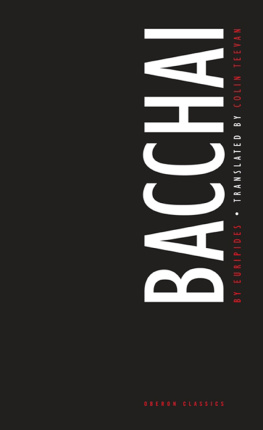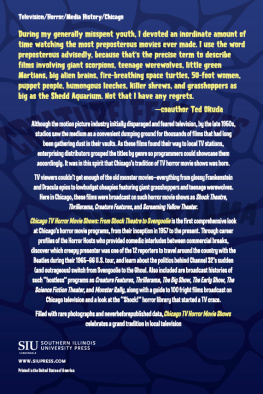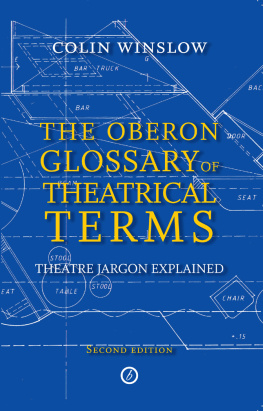BACCHAI

Euripides
BACCHAI
Translated by Colin Teevan Introduction by Edith Hall OBERON BOOKS
LONDON First published in this translation in 2002 by Oberon Books Ltd.
Electronic edition published in 2012
Oberon Books Ltd.
521 Caledonian Road, London N7 9RH
Tel: +44 (0) 20 7607 3637 / Fax: +44 (0) 20 7607 3629
e-mail:
www.oberonbooks.com Reprinted in 2007, 2012 Translation copyright Colin Teevan 2002 Introduction copyright Edith Hall 2002 Colin Teevan is hereby identified as author of this translation in accordance with section 77 of the Copyright, Designs and Patents Act 1988. The author has asserted his moral rights. All rights whatsoever in this play are strictly reserved and application for performance etc. should be made before commencement of rehearsal to Curtis Brown Ltd., Haymarket House, 2829 Haymarket, London SW1Y 4SP (). No performance may be given unless a licence has been obtained, and no alterations may be made in the title or the text of the play without the authors prior written consent. You may not copy, store, distribute, transmit, reproduce or otherwise make available this publication (or any part of it) in any form, or binding or by any means (print, electronic, digital, optical, mechanical, photocopying, recording or otherwise), without the prior written permission of the publisher.
Any person who does any unauthorized act in relation to this publication may be liable to criminal prosecution and civil claims for damages. A catalogue record for this book is available from the British Library. PB ISBN: 978-1-84002-261-2
EPUB ISBN: 978-1-84943-614-4 Printed, bound and converted in Great Britain by CPI Group (UK) Ltd., Croydon, CR0 4YY. Visit www.oberonbooks.com to read more about all our books and to buy them. You will also find features, author interviews and news of any author events, and you can sign up for e-newsletters so that youre always first to hear about our new releases. for Madeline
Contents
Introduction
BY EDITH HALL
In antiquity Euripides was famous for being the most accessible of the tragic poets, the one who made his Bronze Age heroes speak ordinary dialogue, which could be understood as easily as contemporary vernacular by Euripides own fifth-century BCE audience.
Of all the tragedians it was Euripides who was said by Aristophanes the comic poet and the philosopher Aristotle to have invented domestic tragedy and who really knew how to make his heroes and heroines sound human. His poetry was accessible, intensely speakable, and easily memorised: anecdote upon anecdote tells how ordinary ancient Greeks and Romans, not just professional actors, loved to learn passages of Euripides off by heart for their own amusement. But at the same time Euripidean poetry includes passages of elevated diction, and is often marked by his distinctive characteristics of multilayered irony, wit, rhetorical precision, lyric virtuosity, sinuous versification, and colourful imagery. The modern translator of Euripides has, therefore, a frighteningly tough act to follow. Aeschylus and Sophocles, the other two ancient Greek tragedians, have in recent decades been fortunate in the excellence of poets who have adapted some of their plays for performance in the English language. It is thus paradoxical that Euripides, whose Medea and Trojan Women are performed as much as any other Greek tragedy and are acknowledged as classics of world theatre, has attracted few outstanding English-language translations.
Truly readable (let alone actable) versions of Euripides are thin on the ground. The apparently realistic tone of much Euripidean dialogue has also meant that he has been far less likely to be realised in masks than either Aeschylus or Sophocles, whose apparently more formal poetry is perceived to be more suited to masked delivery. Playscripts susceptible to masked performance require very special qualities of rhythm, pace, diction and style, and a particular type of relationship between actor, costume and stage property. It is even more difficult to produce a playscript which can be delivered, according to the ancient Greek convention, by a chorus plus a cast of only three male actors sharing all the speaking roles between them. A major reason for the coherent vision and integrity of Colin Teevans rendering of Bacchai, commissioned for performance by the National Theatre in London, is that at every stage in its evolution it has been envisaged as an acting text for realisation not only in masks, but (as in the original production of Euripides masterpiece in 405 BCE) by no more than three actors. In one of the most astonishing moments in world theatre, at the heart of Bacchai, Dionysus, the god of drama, becomes a stage director.
In disguise as a mortal himself, he leads in Pentheus, king of heroic Thebes, arrayed in the feminine dress of a bacchant. After adjusting the transvestite monarchs hair, hemline, posture and (most importantly) his perception of reality, he charmingly escorts him out to the countryside to die. Dionysus is of course the theatrical star of this show-stopping scene, as he is protagonist of Bacchai as a whole: but he is simultaneously its author, costume designer, choreographer and artistic director. King Pentheus is symbolic of the experience of every actor and every audience who has ever renounced reality and participated in the mimetic journey into dramatic illusion, the mysterious act of complicity by which Dionysus conjures actor and audience together into the other times and other places he can create in his theatre. Pentheus is both actor and audience; himself in disguise, playing the role of female bacchant, he is in turn deceived by the false identity assumed by the apparent priest, his cousin and adversary Dionysus. Pentheus is in a state of trance; he thinks he can see two suns, two cities, and that his companion is a horned bull.
His delusion is painful and belongs to the realm of the tragic; his transvestism and vanity are decidedly comic. Pentheus and Dionysus thus play out in front of the audience the very process of assuming an altered identity and with it a transformed consciousness the process inseparably identified in Greek culture with Dionysus, the god who presides over the various delusions associated with wine, with madness, and with theatre. In ancient Greece tragedies were performed, as in the production of Bacchai for which this translation was prepared, by only three masked male actors and a masked chorus. The actor of ancient tragedy had to be highly flexible, able to assume several different identities in the course of a single production. The transformation from Dionysus into Teiresias or Pentheus into Agave, often within only a few minutes offstage, was made possible by the masking convention, but was still extremely challenging. The protean ability of the expert player to assume multiple identities in the course of a performance was much admired by ancient theatre-goers, but was also regarded as a frightening, destabilising, and socially dangerous renunciation of identity, especially when it entailed visibly turning into a woman.
Some ancient actors were specialists in youthful and female roles (it is likely that the actor playing Pentheus and Agave was one such); others were especially famed for their dancing, singing, or thrilling performances of messenger speeches. In a form of theatre uninterested in realism of facial expression, the ancient actor was highly skilled at voice modulation, and must have been plausibly able to impersonate radically different types of voice in the course of a production. The ancient actor imitated his tutelary deity, Dionysus, who was a master of disguise and metamorphosis. Yet there can be no doubt that the playwrights and actors exploited the internal echoes, ironies and suggestive parallels which this distinctive performance convention made possible. If the same actor who plays Pentheus also plays his mother indeed enters the theatre brandishing his mask, the synecdochic substitute for his head the intimate family relationship, and thus the pathos of the infanticide, are immeasurably heightened. Repeatedly this play asks its audience to meditate upon the nature and function of the dramatic mask which made the actors serial metamorphoses physically possible and theatrically plausible.









 Euripides
Euripides